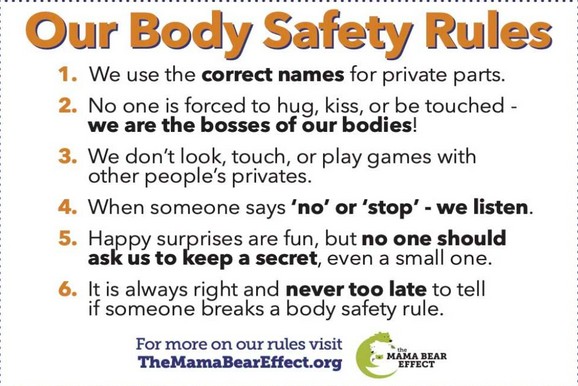In this Lesson
In this part of the course we learn how to prevent child sexual abuse by educating ourselves and our children.
SYLVIA
PREVENTION
Keeping children from being abused is the PARENTS’ responsibility
educating yourself
educating your children
building a prevention team
stepping in when you see concerning behavior
Educate yourself
you’re doing it right now by doing this workshop
read books/articles
follow experts on CSA prevention on social media
do workshops/seminars
listen to podcasts
2. Educating your children
Fear doesn’t keep a child safe, training does, so focus on treating your child right, education, self confidence, having a strong relationship with your child, treating your children with respect and as an equal.
Children know the difference between an appropriate and an inappropriate touch, what they like/want or don’t, have good instincts, they just need to know that they’re allowed to express themselves and usually this natural reaction of saying NO has been punished out of them.
Source: https://safechild.org/wp-content/uploads/2020/07/Introductory-and-Resource-Manual.pdf
Modeling is key!!! Set and respect boundaries.
Then educate and set rules:
Educate your child about sexuality and their body parts (www.amaze.org)
Your body, your choice! You’re the boss of your body! You have the right to say who touches it or not.
You have permission to say NO to anybody, regardless of their age, position, authority when you feel uncomfortable
always respect when your child says No to you (your behavior and reactions say more than 1000 words)
4. ‘I’m going to tell’
Your child needs to know that he or she can tell you anything and that he or she can say this phrase at anytime when another person is not listening to them saying No
for this to actually work (your child believing that he can tell you anything) you musn’t get angry when he does something wrong or makes a mistake
5. No secrets
Surprises, confidentiality and privacy are ok, secrets not. Explain the difference to your children and stop keeping secrets from them, too.
no more little secret games like ‘let’s not tell mummy I bought you an ice cream’ etc
‘If someone asks you to keep a secret, reply ‘No, I’m going to tell’’
6. ‘You are not responsible for other people’s feelings or mistakes’
explain what bribery, threats and manipulation means (teach critical thinking and talk about psychology)
modeling is key (work on your manipulative behaviors towards your child or spouse)
stop saying things like ‘you’re making me angry’ or ‘I get sad when you…’ and explain to your child that you were wrong in saying these things, apologize. Let them know you will always love them, no matter what.
7. Body language, words and eye contact need to match when setting boundaries
Play the ‘What if…’ game (critical thinking)
Practicing saying No to touch or behavior that a child doesn’t like
Role-playing is acting out each scenario so children learn the skill, not just the concept
Program with videos to teach children of different age groups the above mentioned when dealing with people they know:
https://safechild.org/prevention-of-child-sexual-abuse/
Program with videos to teach children of different age groups the above mentioned when dealing with strangers:
https://safechild.org/safety-around-strangers-children-in-self-care/
Listen and pay attention to your child so that you can hear hidden messages as well
‘Last night daddy ate my cookie’ (3 yo being sexually abused by her father)
‘I don’t want to play those games with grandpa anymore’ (grandfather abusing grandchild)
‘I don’t want to sleep on the sofa‘ (brother abusing sister)
Ask open questions:
‘I don’t want to go to my ballet class today’ (how come?)
‘My friend asked me to have a sleepover but I don't’ want to’ (You usually like having a sleepover at hers. What happened?)
‘When is the babysitter coming back?’ (I don’t know. Why do you ask?)
Always believe your child! Kids don’t make abuse up



